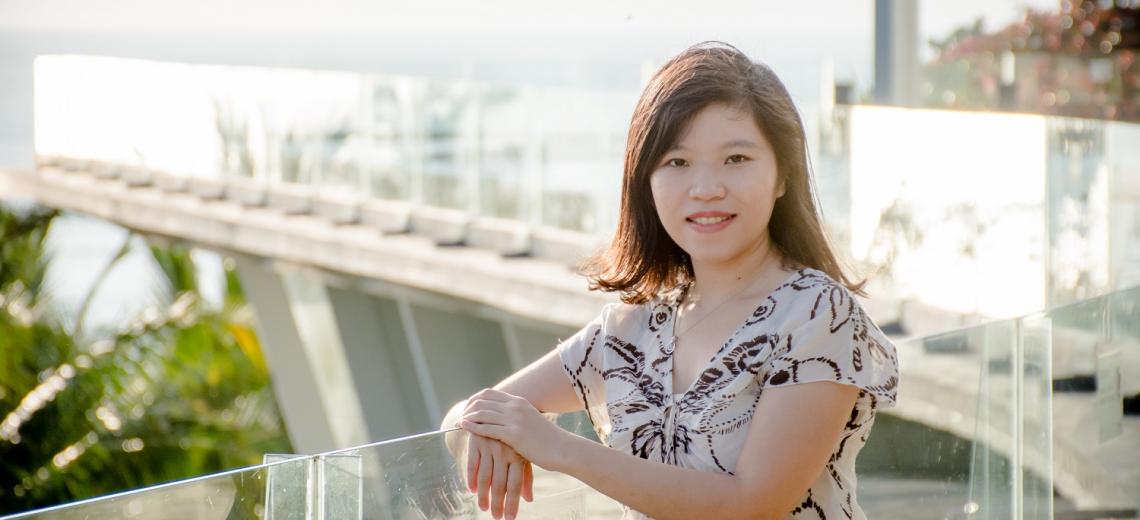
8 minute read
In an interview where she emphasises the importance of balancing technology and people in strategic communications, CBE alumna Iris Chan shares her industry insights on customer experience in the Asia Pacific, why a company’s most important asset is its talent and how her ANU experience influenced her most formative years.
From your experience, could you identify the most significant change to the world of strategic communications?
The rapid development and adoption of new technology has changed how organisations communicate with their stakeholders. With the use of big data, communicators can analyse the needs, behaviours, attitudes and opinions of stakeholders in greater depth, and influence important business decisions. Long gone are the days when companies sent out mass cold emails and assumed their randomised recipients would open them. Communicators today are expected to listen to their stakeholders more closely and to frequently create personalised messages that are relevant to their needs.
Communicators today are expected to listen to their stakeholders more closely and frequently.
What are your observations about customer experiences and expectations in the Asia Pacific?
With the high usage numbers of smart devices and the expansion of 5G infrastructure, many companies in the region have increased their investment in business technology. While digital tools can enhance the customer experience, many have overlooked the continuous importance of human interactions in the customer journey.
How many times have you hesitated to purchase a seemingly good product from an online store, worrying about the absence of a 24-hour customer hotline that you can call directly to ask questions? How many times have you been frustrated about the overly generic response you received from a chatbot when you were trying to make a complaint? Although Artificial Intelligence (AI) will continue to evolve and may eventually impersonate a genuine human response, it will always remain “artificial”. Many consumers in the region still prefer interacting with humans over automated services. After all, humans, unlike machines, can leave the script behind to go above and beyond in delivering an authentic experience for customers. The balanced use of technology and human element has become a key differentiator between an average brand and a well-loved one that keeps its customers going back for more.
The balanced use of technology and human element has become a key differentiator between an average brand and a well-loved one.
You went on three exchange programs while you were pursuing your Bachelor degree at CBE. Could you share how your experience shaped your personal development?
What attracted me to pursue a degree in International Business at CBE was the global network it offers. I knew from the beginning that I would like to go on at least one exchange program before I graduated to put the cultural awareness and language skills I have learnt in class into practice. I never imaged I would study abroad three times during the three-year program, and receiving the generous support along the way from CBE.
Studying and surviving in another country, whether short- or long-term, requires the ability to adapt quickly. No matter it is walking on slippery surfaces in winter in Novosibirsk or collecting data in socially disadvantaged communities in Nadi, I have developed two important skills that will go a long way in my career and life – flexibility in the face of change and finding my inner strength in difficult times. You simply cannot learn these crucial life skills sitting alone in a lecture theatre.
I never imaged I would study abroad three times during the three-year undergraduate program at ANU.
During your Masters at ANU, you specialised in Management. How are you practicing the theories that you learnt?
Human Resources (HR) management is a function that is often viewed as process-oriented and tactical, but what I have learnt from my Master Program is that HR plays a crucial role in connecting a company’s most important asset – the talent – with the organisation’s mission, values, culture and goals. As a communications and employer-brand consultant, I help companies drive customer loyalty through the effective engagement of employees. Helping HR leaders to link people strategies to business results is what I enjoy doing at work.
The research and analytical skills I have learnt at ANU have enabled me to translate complex sources of data into meaningful insights that help align employee behaviour and customer experience. Crafting a compelling employee engagement strategy or winning buy-ins for positive workplace practices is never easy but knowing that there are alumni working toward the same goals makes the journey of change easier.
The research and analytical skills I learnt at ANU enabled me to translate complex sources of data into meaningful insights.
Since graduating from ANU with a Bachelor in International Business and a Master of Business (honours), you have held several key positions in your career. In which ways do you feel your experience at ANU could be linked to your success?
During my university years, I had the opportunity to work with students from different countries and cultures. The diversity at ANU, including its international and interstate students, has given me valuable practical experiences in managing across cultures and finding common ground across
differences. These skills are the founding blocks I used to thrive in multicultural teams and promote diversity and inclusion in the workplace.
I am also thankful to the alumni mentors whom I met early in my career, who volunteered their time and energy to guide me through career decisions and contributed to my early career successes.
The ANU College of Business and Economics offers an extensive range of specialised programs. Click here for more details.
